Seven members of the University of Iowa family will be recognized during the Hawkeye Distinguished Veterans Awards on Nov. 15.
The ceremony, which starts at 5 p.m., will be hosted by Matthew Miller, program director for UI Military and Veteran Student Services. U.S. Army Major General (Ret.) Stewart W. Wallace, will emcee the event. Criteria for the award include a strong university connection, having served honorably, military accomplishment, and service to the community.
The event is sponsored by the Chief Diversity Office and the Center for Diversity and Enrichment.
Available awardees will be recognized at the Nov. 10 Iowa football game against Northwestern University.
The 2018 recipients of the Hawkeye Distinguished Veterans Memorial Award are:
- Tiffany Baker-Strothkamp, U.S. Army
- Fred Baker, U.S. Army
- Clarence E. Hamilton, U.S Army
- Geraldene Felton, U.S. Army
- Evelyn Crary Bacon, U.S. Army
- Scott R. Daly, U.S. Army
- Warren Lawson, U.S. Army
The event is sponsored by the UI Army ROTC and Air Force ROTC programs, the Division of Student Life/Iowa Memorial Union, UI Military and Veteran Student Services, and the Hawkeye Distinguished Veterans Memorial Awards Committee.
Each award recipient also will be recognized with a plaque displayed in the Iowa Memorial Union, which was created to pay tribute to Iowans who served their country. The Memorial Honor Roll on the first floor of the IMU recognizes students and alumni who have given their lives in service to the nation as members of the armed forces.
More about the honorees:
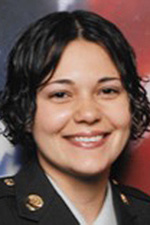
Tiffany Baker-Strothkamp is a graduate student from Ellettsville, Indiana, in the Rehabilitation and Mental Health Counseling Program in the UI College of Education. Baker-Strothkamp served in the U.S. Army from 2006 to 2015, including two tours of duty in Afghanistan. During her military career, she received multiple medals and commendations, including numerous recognitions for her volunteer efforts with the Family Readiness Group and providing mentoring to younger soldiers for professional and personal development.
On campus, Baker-Strothkamp is the current president of the UI Veterans Association, which represents nearly 2,200 veterans and military-affiliated students. In 2018, Baker-Strothkamp revitalized the Peer Advisor for Veterans Education (PAVE) program, which helps veterans transition from the military to college. Baker-Strothkamp also is an active member of Graduate Student Government, the State of Iowa American Counseling Association Planning Committee, and the Student Advisory Board within University Counseling Services.
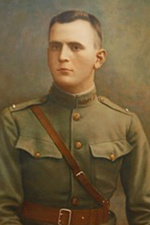
Fred Becker was born in Waterloo, Iowa, and enrolled at the UI in 1915. In 1916, Becker was selected as an all-conference lineman in the Western Conference for the Iowa Hawkeyes and was also a first team all-American, the first player in Iowa history to earn that distinction.
Becker enlisted in the U.S. Army in March 1917 to serve in World War I. He was commissioned as an Army Second Lieutenant in August 1917 and was sent to France after completing training. While serving on the Western Front, Becker was hit by shrapnel on June 13, 1918. However, he was able to return to duty after his recovery and was attached to the 5th Regiment of the U.S. Marine Corps, due to a shortage of Marine Corps officers.
During an attack by German soldiers, Becker’s platoon was pinned down by machine gunfire. Becker moved forward and assaulted the machine gunner, allowing his platoon to advance. After completing his assault, Becker was killed in action on July 18, 1918. His actions were crucial in “preventing the death or injury of many men in his command,” according to a U.S. Marine Corps report.
Becker was awarded the American Distinguished Service Cross, the Belgian War Cross, and the French War Cross.
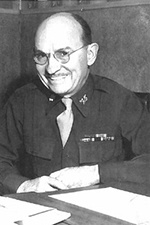
Clarence Hamilton was a UI College of Law student when he left to serve as an ambulance driver during World War I. Hamilton was awarded the Croix de Guerre by the French government for his bravery.
Hamilton returned to Iowa Law after World War I and graduated in 1921. After starting in private practice, Hamilton was elected county attorney and later special assistant to the attorney general of Iowa.
In 1943, at the age of 50, Hamilton re-enlisted in the Army as an attorney. Hamilton headed all civil courts and prisons in Nuremberg and Bavaria, tried thousands of cases, and was tasked with the de-Nazification of the civil courts system. Upon returning from Germany, Hamilton continued practicing as an attorney and served as a District Court Judge in Johnson County from 1960 to 1968. When he retired from the bench at 75, Hamilton resumed his private practice work.
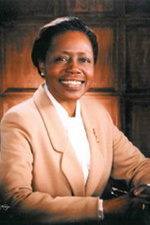
Geraldene Felton joined the U.S. Army Nurse Corps in 1949. Felton served as staff nurse until 1956 and went on to hold a variety of additional nursing and clinical positions, eventually serving as deputy director of the Department of Nursing at the Walter Reed Institute of Nursing. After her retirement from the Army Nurse Corps in 1975, Felton became professor and dean of nursing at the Oakland University School of Nursing in Rochester, Michigan.
Felton joined the UI as professor and dean of the College of Nursing in 1981. During her tenure as dean of the College of Nursing, Felton implemented a research-based program, which included hiring PhD faculty and starting a College of Nursing PhD program.
Felton is a charter fellow of the American Academy of Nursing and an American Academy of Nursing Living Legend. In 2012, Governor Terry Branstad named Felton an Iowan African American Woman History Maker.
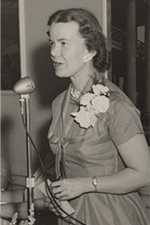
Evelyn Crary Bacon earned a bachelor’s degree in political science from the UI in 1938 and a graduate nursing degree from the university in 1940. Bacon went on to serve in the U.S. Army Nurse Corps in 1942, acting as head nurse supervisor. She participated in the invasion of Normandy during World War II.
In 1950, Bacon moved to Richmond, Virginia. She led the movement to establish the School of Nursing at the University of Virginia. In 1972, Bacon became associate professor and program head of nursing at J. Sargeant Reynolds Community College in Richmond. In 1981, Bacon was elected chair of the Richmond Red Cross, becoming the first woman to hold that position. After her retirement, Bacon volunteered as historian for the Virginia Nurses Association. She was posthumously recognized by the Virginia Nurses Association as an Outstanding Nurse in 1999 and was named a Virginia Pioneer Nurse in 2000.
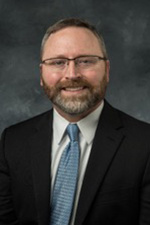
Scott R. Daly was born in Joliet, Illinois, and grew up in a small community north of Ocala, Florida. After graduating from high school in 1998, Daly enlisted in the U.S. Army as an M1 Abrams armor crewman. During his military career, Daly received multiple awards.
After being honorably discharged in August 2001, Daly earned his bachelor of science degree in chemistry from North Central College in Naperville, Illinois. In 2010, Daly received his PhD in chemistry from the University of Illinois at Urbana-Champaign. After holding positions in New Mexico and Washington, D.C., Daly joined the UI.
Daly is an assistant professor of chemistry and runs a research group of eight doctorate students and five undergraduate researchers. His research is funded by the National Science Foundation, American Chemical Society, and the Department of Energy.
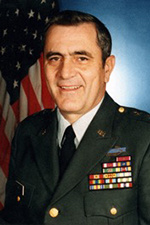
Warren Lawson was born in Fairfield, Iowa, and enrolled at the UI in 1951. Lawson earned a Bachelor of Science in commerce from the university while playing center for the football team. He was named Iowa’s Most Valuable Player in 1954.
After graduating from UI ROTC in June 1955, Lawson was commissioned as an infantry second lieutenant in the U.S. Army. He served in numerous units and locations, including a tour in Vietnam.
Lawson earned a Master of Arts in industrial management from the University of Nebraska in 1966. In August 1970, he assumed command of the 4th Battalion, 54th Infantry at Fort Knox, Kentucky, where he remained until 1972 when he was selected for the U.S. Army War College.
On June 30, 1979, Lawson retired from active service. The next day, he was appointed deputy adjutant general of the Iowa National Guard. He was appointed adjutant general of the Iowa National guard on May 1, 1985. During his time as adjutant general, Lawson led the Iowa National Guard through the Iowa Farm Crisis, Operation Desert Shield/Desert Storm, reactivation of the 34th Infantry Division, the flood of 1993, and the Port Neal complex chemical plant explosion near Sioux City.